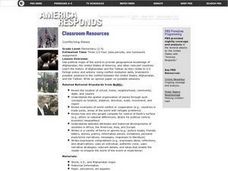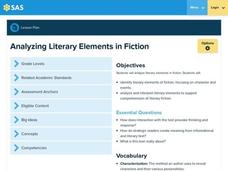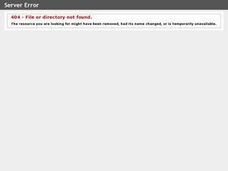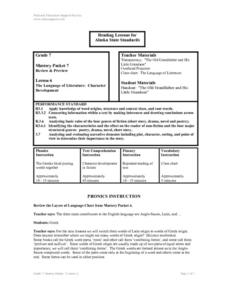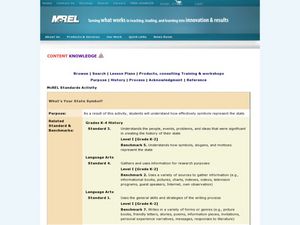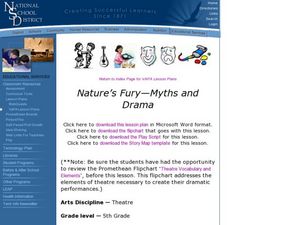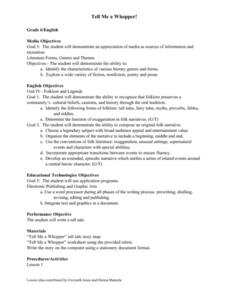Curated OER
My Writing Portfolio
Emerging writers create a portfolio showcasing various writing formats. They discuss Alexander and the Terrible, Horrible, No Good, Very Bad Day. They observe the key features of picture books and then create their own book to add to...
Curated OER
The Figure of Paul Revere. Romanticizing Colonial American History
Pupils compare paintings to make conclusions about American History in the Revolutionary War time period. Students share opinions concerning visual art. Other artwork can be used to entice inquiry as needed.
Curated OER
Pick a Pet
Students design informational materials to educate people on the importance of matching a new pet to the family's lifestyle and living arrangements. Students use critical thinking skills to make a decision on the appropriate choice for a...
Curated OER
Introducing Literary Elements in Fiction
Identify literary elements in fiction. In this reading comprehension lesson plan, learners read the book Pigsty and record literary elements onto a graphic organizer. They specifically discuss the main characters and events in the text.
Curated OER
Football: It's Not Just for Jocks!
Eighth graders complete a variety of football-themed activities. They develop creative writing projects with a football inspiration, research and interpret football statistics and practice football skills in P.E.
Curated OER
Conflicting Views
Students complete a Venn diagram comparing the United States and Afghanistan. They research the history of the Taliban and how they relate to the United States and its foreign policy. They write a paper on possible solutions.
Curated OER
Unit Plan for Mark Twain and American Humor
Students create brochures about the humor of Mark Twain. In this literature-analysis lesson plan, students read "The Celebrated Jumping Frog of Calaveras County" and other short stories by Twain. Students write analytical paragraphs and...
Pennsylvania Department of Education
Analyzing Literary Elements in Fiction
Students analyze the characters and events in fictional writing. In this literary elements lesson, students study the meaning of the words characterization and fiction. They listen to the story Pigsty by Mark Teague, or any other book...
Curated OER
The Time I Got Lost
Third graders go through the writing process but substitute paper and pencil with the computer to create a story about "The Time I Got Lost".
Curated OER
Job Interview
Eighth graders write a multi paragraphed, expository composition that explanins how one would conduct themself before, during, and after a job interview. In order to be prepared for the interview, 8th graders complete a thesis, have an...
Curated OER
Analysis of Character in a Short Story
Ninth graders examine a character from the short story, John Steinbeck's, "Flight." students respond to questions about the story and illustrate the character's journey.
Curated OER
The Stinky Cheese Man and Other Fairly Stupid Tales
Sixth graders demonstrate the ability to process and evaluate content from a variety of sources and apply comprehension skills to the material read. They organize information for practical use and design and develop an informational...
Curated OER
Greek Origins and Character Development
Seventh graders examine words of Greek origin and discuss character development in fiction. They read a list of Greek word parts and create words on a worksheet. Students then read and discuss an informational handout about character...
Curated OER
Greeting Card to A Character
Students create a greeting card from one character to another after finishing a novel. Individually, they use their imagination to write the paragraph using the text to support their ideas. They share their greeting card with the class...
Curated OER
Color My World
Students identify colors created by mixing primary colors and describe the process. They then design a book using the colors of a given season entitled "Colors of the Season".
Curated OER
Acting Like a Bunch of Animals: Fables and Human
The video "The Tales of Aesop" traces for viewers the history of fables and identifies their characteristics. The class then goes to the web site "The Fisherman and the Little Fish" where they examine the classic and a modern version of...
Curated OER
My Favorite Things
Pupils identify "masterpieces" and mass-produced objects. They explain why they value a given object and determine what physical materials were used to create the objects. They create a class book featuring objects that they value.
Curated OER
Charlie and the Chocolate Factory
Fourth graders research and write an author report on Roald Dahl, including books written by him, birthplace, family life, and other information on his writing. Students read aloud chapters in the book. Students create a newspaper...
Curated OER
What's Your State Symbol?
Students explore their state symbols. In this symbolism lesson, students use a variety of resources to research the symbols that represent their state. Students discover the state flower, state flag, and state bird.
Curated OER
Nature’s Fury—Myths and Drama
Fifth graders explore the elements of theatre. In this dramatic performances lesson, 5th graders discuss the structural elements of theatre and dramatize "The Origins of the Season," an explanation myth.
Curated OER
Tell Me a Whopper!
Sixth graders investigate tall tales as a literary genre. They listen to a number of tall tales to discover how exaggeration is used as a story element. They write and publish a tall tale using word processing software. They illustrate...
Curated OER
Twenty-one Balloons
Fifth graders determine what the Newbery Award is and why it is importance. They examine a number of Newbery Award winning books and listen to a book talk about William Pene DuBois', Twenty-One Balloons while watching a PowerPoint...
Curated OER
Reporting Live From...
Young scholars examine the many disasters in West Virginia. In this US history lesson, students write about and give an oral presentation of one of the disasters as if they were reporters.
Curated OER
Out of the Dust -- Part II
Eighth graders discover that literature can be a great way to gather information about the past. Using various types of text, they research its historical data and determine if it is correct. They write two papers to respond to the...







